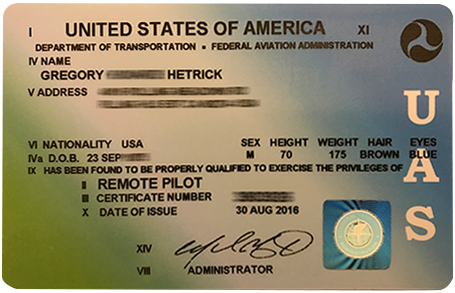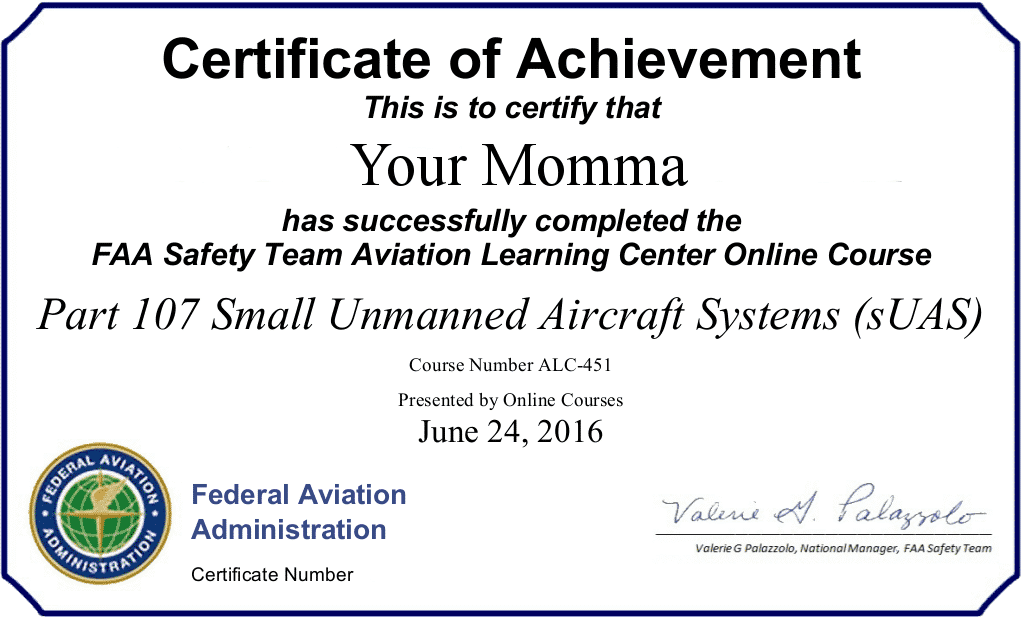

- COMMERCIAL DRONE PILOT LICENSE MANUAL
- COMMERCIAL DRONE PILOT LICENSE PRO
- COMMERCIAL DRONE PILOT LICENSE TV
They can also access spaces that are impossible to access by humans or other types of drones.

Similarly, small FPV drones can be used for inspections to access those hard-to-reach places, where several personnel and expensive equipment would otherwise be needed for access.

The main competitor to FPV drones in this sector is the Matterport service.
COMMERCIAL DRONE PILOT LICENSE TV
Many drones used for Film & TV are privately built, and the flight characteristics are tuned to ensure that vibrations from both the drone and external factors are minimised.įPV drones can also create extremely smooth video tours and can be used both indoors and outdoors, which has made them popular for creating marketing videos exploring interior spaces. This requires not only good drone handling, but also good drone tuning. This requires pilots to have a good amount of flying experience and control in order to fly FPV drones at a commercial level.įor example, for Film & TV, FPV pilots need to be able to fly extremely smoothly in order to keep the subject of the shot in focus and not detract from the scene.
COMMERCIAL DRONE PILOT LICENSE MANUAL
With improvements to the UK’s green energy infrastructure being made at a rapid pace, drones can provide a cost-effective way of monitoring renewable energy systems, such as wind turbines and solar farms.įPV drones have little to no flight assistance, requiring manual control of the drone at all times. That being said, I have identified a few sectors where, at the time of writing this article, drone operators and drone services are in demand in the UK. Take your time, and choose sectors where you feel you can add value to the businesses you work with. However, doing anything and everything won’t help you make your mark on the industry. You can also reach out to local sports clubs and businesses to offer your services in exchange for theirs, or at discounted rates, to help develop your portfolio. You need to carve out your space in this industry by identifying what makes your drone services special.Īsk friends, colleagues, or even your current employer whether you can use your drone to create content at any upcoming events. The drone industry is growing all the time, but so is the competition within it. “I have a drone and I am ready to start flying it commercially.”Įven if you have a drone and you have obtained your A2CofC or GVC, the real challenge comes with getting yourself out there and letting people know about your drone services and what you can offer them. If you want to legally fly heavier drones closer to uninvolved people and in built-up areas, then further certification, like the A2 CofC and the GVC, is needed. Secondly, many businesses will only be interested in working with certified drone operators having a minimum of the A2CofC to show that they have a recognised base level of flying competency. Training for the A2CofC and GVC helps you obtain and retain regulatory knowledge and essential skills so you can fly safely and deliver a high standard of service. However, even if you only plan to fly commercially with sub-250g drones, there are several reasons to consider obtaining certifications.įirstly, do you want to be offering drone services to clients without having a good understanding of all the regulations and best practices?
COMMERCIAL DRONE PILOT LICENSE PRO
In the UK, drones like the DJI Mini 3 Pro that have a mass less than 250g can be flown over and close to uninvolved people in the Open Category, even without the A2CofC or GVC, but they cannot be flown over crowds or assemblies of people. In summary, flying heavier drones closer to people requires some training and certification and, in some cases, an Operational Authorisation from the CAA. The CAA have several guidance documents on these categories and their respective restrictions, a summary of which can be found here.

These categories are based on the mass of the drone you want to fly and how close you want to fly it to uninvolved people (people not involved with your drone flight). The Certified Category (Further certification).The Specific Category (GVC + Operational Authorisation).The Open Category (DMARES test, A2CofC).In line with the regulations brought in for Europe, regulation of unmanned aviation in the UK is now defined in three categories: This has been superseded by three levels of certification, which include the CAA’s DMARES test, the A2 Certificate of Competence (A2CofC), and the General Visual Line of Sight Certificate (GVC). Previously you would have needed to submit a request for permission for commercial operations (PfCO) and obtain an Operational Authorisation from the CAA. Which drone you have and where you plan to fly it will determine what certifications you need as an operator. To become a commercial drone pilot in the UK, you merely need to be registered with the Civil Aviation Authority (CAA) and have EC785/2004 compliant commercial insurance.


 0 kommentar(er)
0 kommentar(er)
